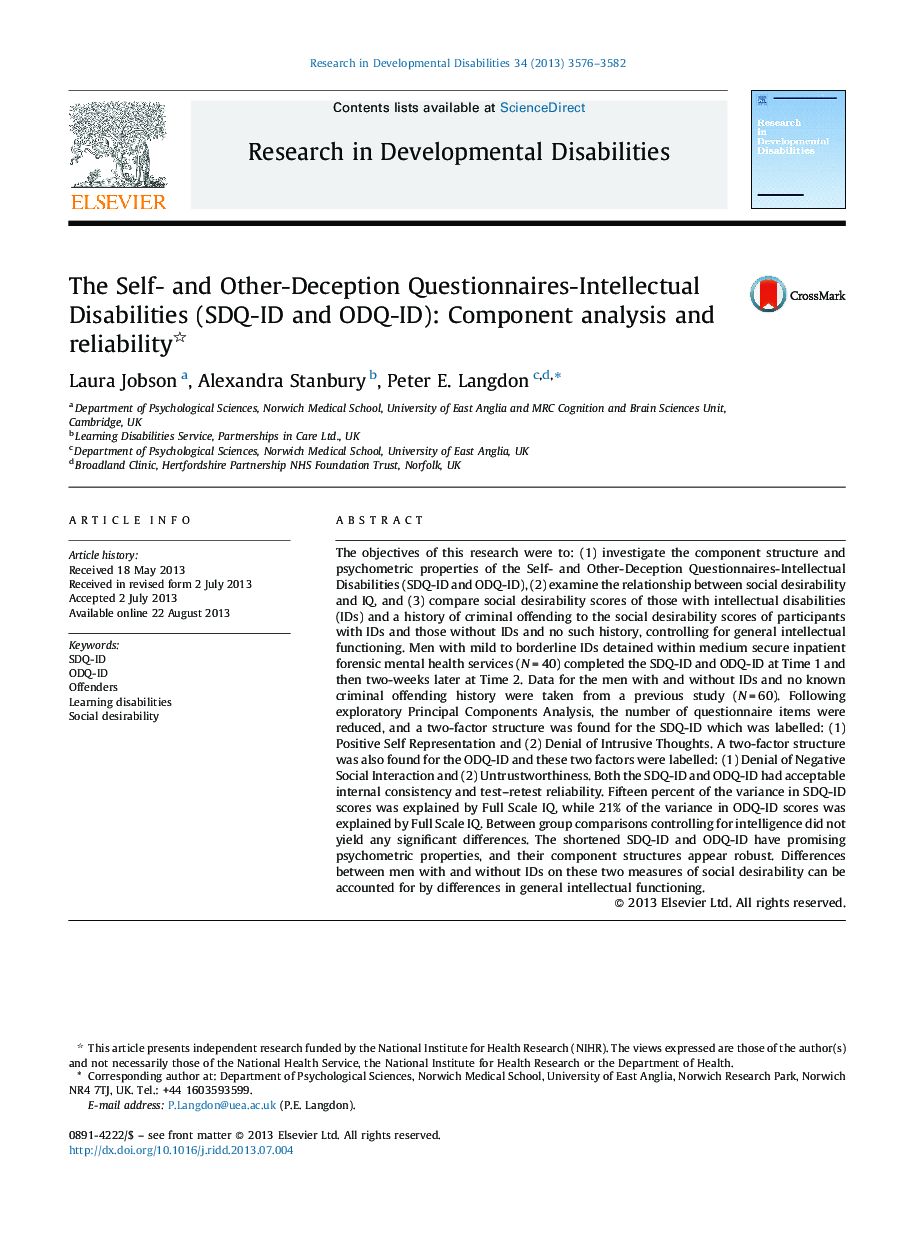| کد مقاله | کد نشریه | سال انتشار | مقاله انگلیسی | نسخه تمام متن |
|---|---|---|---|---|
| 10317947 | 621934 | 2013 | 7 صفحه PDF | دانلود رایگان |
عنوان انگلیسی مقاله ISI
The Self- and Other-Deception Questionnaires-Intellectual Disabilities (SDQ-ID and ODQ-ID): Component analysis and reliability
دانلود مقاله + سفارش ترجمه
دانلود مقاله ISI انگلیسی
رایگان برای ایرانیان
کلمات کلیدی
موضوعات مرتبط
علوم زیستی و بیوفناوری
علم عصب شناسی
علوم اعصاب رفتاری
پیش نمایش صفحه اول مقاله

چکیده انگلیسی
The objectives of this research were to: (1) investigate the component structure and psychometric properties of the Self- and Other-Deception Questionnaires-Intellectual Disabilities (SDQ-ID and ODQ-ID), (2) examine the relationship between social desirability and IQ, and (3) compare social desirability scores of those with intellectual disabilities (IDs) and a history of criminal offending to the social desirability scores of participants with IDs and those without IDs and no such history, controlling for general intellectual functioning. Men with mild to borderline IDs detained within medium secure inpatient forensic mental health services (NÂ =Â 40) completed the SDQ-ID and ODQ-ID at Time 1 and then two-weeks later at Time 2. Data for the men with and without IDs and no known criminal offending history were taken from a previous study (NÂ =Â 60). Following exploratory Principal Components Analysis, the number of questionnaire items were reduced, and a two-factor structure was found for the SDQ-ID which was labelled: (1) Positive Self Representation and (2) Denial of Intrusive Thoughts. A two-factor structure was also found for the ODQ-ID and these two factors were labelled: (1) Denial of Negative Social Interaction and (2) Untrustworthiness. Both the SDQ-ID and ODQ-ID had acceptable internal consistency and test-retest reliability. Fifteen percent of the variance in SDQ-ID scores was explained by Full Scale IQ, while 21% of the variance in ODQ-ID scores was explained by Full Scale IQ. Between group comparisons controlling for intelligence did not yield any significant differences. The shortened SDQ-ID and ODQ-ID have promising psychometric properties, and their component structures appear robust. Differences between men with and without IDs on these two measures of social desirability can be accounted for by differences in general intellectual functioning.
ناشر
Database: Elsevier - ScienceDirect (ساینس دایرکت)
Journal: Research in Developmental Disabilities - Volume 34, Issue 10, October 2013, Pages 3576-3582
Journal: Research in Developmental Disabilities - Volume 34, Issue 10, October 2013, Pages 3576-3582
نویسندگان
Laura Jobson, Alexandra Stanbury, Peter E. Langdon,